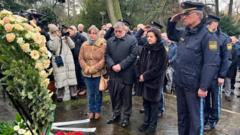In a dramatic shift in Germany's immigration discourse, Friedrich Merz, the opposition leader mainstreaming anti-immigration sentiments, has pledged to overhaul border control measures in response to a knife attack that left two individuals dead, including a two-year-old boy. The attack, which took place in Aschaffenburg, Baden-Württemberg, involved an Afghan suspect who had previously sought asylum in Germany.
Merz, whose Christian Democrats currently lead in the opinion polls ahead of the federal elections on February 23, has called for a comprehensive closure of borders for irregular migrants, emphasizing that the country has "reached the limit" of its immigration policies. He vowed that on his first day as chancellor, he would delegate the management of Germany’s borders to the interior ministry.
Chancellor Olaf Scholz also condemned the attack as an "act of terror," despite the absence of evidence suggesting a terrorist motivation. The Afghan suspect, who arrived in Germany in 2022, was reportedly involved in three prior violent incidents and had been under psychiatric treatment.
Merz's promised reforms echo nationalist sentiments similar to initiatives by former U.S. President Donald Trump, as both leaders have framed immigration control as an urgent priority. These developments come amid rising influence from the far-right Alternative for Germany (AfD) party, which has capitalized on public fears surrounding immigration. The AfD’s leader, Alice Weidel, has called for immediate parliamentary action to close borders and expel irregular migrants in light of this tragedy.
Critics caution that Merz's hardline stance may merely amplify AfD's rhetoric rather than provide substantive solutions. Others express concern that such policies could backlash against mainstream parties. Political analysts note that any fundamental changes could be hampered by coalition negotiations, as Merz’s party may need to partner with more liberal factions that resist stringent immigration policies.
The tragic events in Aschaffenburg have not only sparked outrage but also reignited conversations about national policy direction, drawing attention to the complexities of Germany’s asylum landscape amid rising violence associated with migrant populations. The knife attack remains a haunting reminder of the multifaceted challenges that Germany faces as it navigates the contentious issues of immigration and security in a politically charged environment.




















